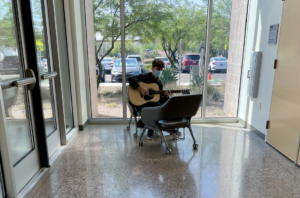DLN Report Card: Advancing Course Access in Michigan

Digital Learning Now an initiative of the Foundation for Excellence in Education (ExcelinEd) recently released the 2014 Digital Learning Report Card. The fourth annual Report Card examines each state’s progress in implementing policies that give students access to quality digital learning and it grades each state’s 2014 digital education policies against the 10 Elements of High-Quality Digital Learning.
This post is a continuation of our weekly series of state stories from the Report Card that highlight progress and share success stories from individual states across the nation. Stories are based on interviews with policymakers and stakeholders and are published in collaboration between Digital Learning Now and Getting Smart.
Today, we look at advancing Course Access in Michigan. This blog first appeared on The EdFly Blog.
In 2013, Governor Snyder and the Michigan Legislature took action to increase student access to quality digital learning opportunities. They did this by establishing Section 21f of the State School Aid Act (originally MI HB 4228). This law focuses on both course eligibility and access, providing guidance for families and districts regarding online learning options.
The Michigan Department of Education and Michigan Virtual University (MVU) are key to the implementation process. According to MVU President and CEO Jamey Fitzpatrick, “[t]hese entities work together to catalyze innovation, facilitate governance and provide services.”
Over the past year, Michigan has built on this policy to streamline offerings and work toward ensuring that Course Access will be a sustainable part of its educational ecosystem. The state is using Section 21f to:
- Expand Choice. Michigan students may take up to two online classes, and can choose from over 1,900 courses via the centralized Michigan’s Online Course Catalog. And what would this look like in real life? A student from rural southwest Michigan could choose to take four of her six classes at her local brick-and-mortar high school. For the remaining classes, she could opt for two online courses: a bioethics course through Michigan Virtual School and a Mandarin Chinese course class taught by a university-level instructor and eligible for college credit.
- Govern Growth. The state has instituted a process to ensure all courses included in the statewide catalog meet certain criteria and use a standard format for all syllabi. The process includes review of state content standards and uses iNACOL’s online learning standards as part of the evaluation. One district was excited to offer an innovative math course statewide, but did not meet the criteria the first time around. They went back to the drawing board to ensure the course met all standards.
- Maintain Local Role. While online course options are available to all students, local school administrators have a final say in whether a course fits based on criteria such as graduation requirements or assessed competency level.
- Provide District Options. On the delivery level, districts maintain the right to determine their level of engagement as an online learning provider. For example, districts can choose to develop their own content per state criteria and/or partner with a third party vendor.
 In either case, local school board control remains a key part of the equation.
In either case, local school board control remains a key part of the equation.
One lesson the state has learned is that a policy such as this comes with the responsibility to ensure families are informed about their available options. Fitzpatrick reflects on key lessons and what he would advise to others implementing such policies: “If I could wave my magic wand and do it over again, I would create greater parental awareness. The biggest challenge with implementation has been awareness.”
Lessons for other states can be gleaned from the work done by a state that has been at this work for nearly 20 years. This policy was not created in isolation, and preceding policies paved the way to expanded choice, governed growth, local role and district options.
For on the Digital Learning Report Card, check out:
- DLN Report Card Preview: Accelerating Students in Florida
- DLN Report Card Preview: Providing Options for Arizona Students
- What Digital Learning Grade Did Your State Earn?

Erin Lockett is a Policy Coordinator at The Foundation For Excellence in Education.







0 Comments
Leave a Comment
Your email address will not be published. All fields are required.